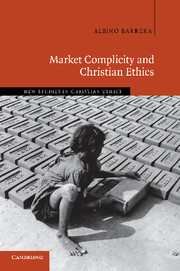Book contents
- Frontmatter
- Contents
- General editor's preface
- Acknowledgments
- Introduction
- PART I THEORY: MATERIAL COOPERATION IN ECONOMIC LIFE
- 1 The nature of material cooperation and moral complicity
- 2 Complicity in what? The problem of accumulative harms
- 3 Too small and morally insignificant? The problem of overdetermination
- 4 Who is morally responsible in the chain of causation? The problem of interdependence
- PART II APPLICATION: A TYPOLOGY OF MARKET-MEDIATED COMPLICITY
- PART III SYNTHESIS AND CONCLUSIONS
- References
- Index
1 - The nature of material cooperation and moral complicity
Published online by Cambridge University Press: 16 May 2011
- Frontmatter
- Contents
- General editor's preface
- Acknowledgments
- Introduction
- PART I THEORY: MATERIAL COOPERATION IN ECONOMIC LIFE
- 1 The nature of material cooperation and moral complicity
- 2 Complicity in what? The problem of accumulative harms
- 3 Too small and morally insignificant? The problem of overdetermination
- 4 Who is morally responsible in the chain of causation? The problem of interdependence
- PART II APPLICATION: A TYPOLOGY OF MARKET-MEDIATED COMPLICITY
- PART III SYNTHESIS AND CONCLUSIONS
- References
- Index
Summary
COOPERATION WITH EVIL
For Christian ethicists, the scholastic notion of “cooperation with evil” (also known as the principle of legitimate material cooperation) is the logical starting point in evaluating our moral responsibility for inadvertently facilitating others' wrongdoing. Our actions that are appropriated and used by others for their misconduct can be described as merely “the occasion (but not the cause) of the sinful deed.” In fact, our actions may yet be morally licit even if we foresee their subsequent misuse by others. Alphonsus Liguori (1696–1787) is credited with formulating this principle in his Theologia Moralis:
That [cooperation] is formal which concurs in the bad will of the other, and it cannot be without sin; that [cooperation] is material which concurs only in the bad action of the other, apart from the cooperator's intention. But the latter [material cooperation] is licit when the action is good or indifferent in itself; and when one has reason for doing it that is both just and proportioned to the gravity of the other's sin and to the closeness of the assistance which is given to the carrying out of that sin.
(Grisez 1997, 873, 876)This principle has been developed even further, and there is wide agreement among commentators on its key distinctions.
Coordinate agent (co-principal) versus a mere cooperator
A coordinate agent or a co-principal is one who has the same wrongful intent as the principal and who performs part of the wrongful act itself. Thus, a coordinate agent (co-principal) is always guilty.
- Type
- Chapter
- Information
- Market Complicity and Christian Ethics , pp. 11 - 29Publisher: Cambridge University PressPrint publication year: 2011

